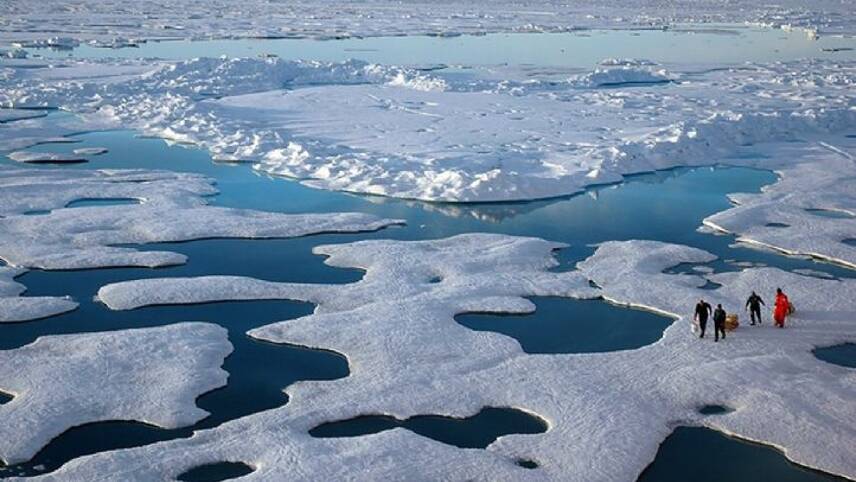Register for free and continue reading
Join our growing army of changemakers and get unlimited access to our premium content

The world is currently around 1C warmer than in pre-industrial times
According to the environmental charity, this area is greater in size than the land covered by Cardiff, Edinburgh, Manchester and Birmingham combined.
Previous WWF research has concluded that the Arctic is warming more than twice as fast as the global average of 1C over the past century, leading ice sheets to melt, sea levels to rise and habitats and biodiversity to be lost.
However, this is the first time that the UK’s carbon footprint, which stood at 150MtCO2 in 2018 after a 1.5% year-on-year decline, has been directly linked to this phenomenon in quantifiable terms. The measurement was made possible by a new methodology developed by WWF and the National Snow and Ice Data Centre’s senior research scientist Julienne Stroeve, which correlates emissions with ice loss based on historical global carbon and ice loss data.
The UK’s CO2 levels were at their lowest levels since 1888 last year – and only during miner strikes in 1893, 1921 and 1926, were levels comparable to those recorded in 2018. However, WWF has argued that the speed of progress which has enabled the UK to reduce its overall carbon footprint by 38% since 1990 will not be sufficient to align with the Paris Agreement’s more ambitious 1.5C pathway.
According to the Intergovernmental Panel on Climate Change (IPCC), limiting warming to 1.5C would require global carbon pollution to be cut by 45% by 2030 – compared with a 20% cut under the 2C pathway – and come down to zero by 2050, compared with 2075 for 2C.
The UK Government is currently seeking advice from the Committee on Climate Change (CCC) on how best to align national policy with these reductions, with the body’s advice expected to be published by the end of May. Ahead of its publication, WWF has today (10 April) launched a petition calling on policymakers to go beyond a net-zero carbon target for 2050 and set a 2045 target covering all greenhouse gases (GHG).
In order to support this transition, the petition calls on all parts of Government to declare a “climate emergency” and to collaboratively work together to end support for fossil fuels; halt fracking; ban airport expansions; invest in clean technology and support nature conservation and restoration in the UK and abroad.
“What we do in the UK is directly contributing to the acceleration of sea ice loss, as a result of climate change,” WWF’s head of climate Gareth Redmond-King said.
“People in the UK expect and deserve action and commitment from their leaders. We have the solutions at our fingertips, but what we’re missing is the political will to deliver them in time. We are the last generation who can halt catastrophic climate change, which is why we need to make our voices heard and fight for our world.”
Calls to action
Within 90 minutes of its launch, the petition had garnered more than 1,120 signatures from UK residents. The Government will be required to respond if 10,000 signatures are added, and to list it for a debate in Parliament if it passes the 100,000 signature mark.
It builds on several key climate-related moves from WWF in recent times, including its decision to support young activist Greta Thunberg’s #SchoolStrike4Climate movement and to fund and co-produce Netflix’s new “Our Planet” series – an eight-part documentary narrated by Sir David Attenborough. The series documents the effects of rising emissions and other man-made sustainability problems on eight different kinds of habitat, including the Arctic, where the loss of sea ice is directly contributing to the deaths of walruses and polar bears.
WWF is also a member of the Science Based Targets initiative (SBTi), along with representatives from CDP, UN Global Compact and the World Resources Institute (WRI). The body recently unveiled new measures designed to help more businesses align their emissions targets with a 1.5C trajectory, including an update to its target validation criteria, which will make a “well-below 2C” pathway a minimum requirement, up from the current 2C criteria.
Other key changes include the publication of a new set of resources for businesses, providing them with practical advice surrounding the goal development, submission and verification processes, and the creation of a “leader board” ranking all new and existing science-based targets by their level of ambition.
The measures are designed to incentivise a “race to the top” in regard to science-based targets. Only four companies – BT, Carlsberg, Tesco and Pukka Herbs – have set verified targets in line with a 1.5C pathway to date.
Away from the SBTi, WWF is also working with food and drink brand Alpro to develop a science-based target framework which goes beyond GHG emissions and supports all planetary boundaries.
Sarah George


Please login or Register to leave a comment.